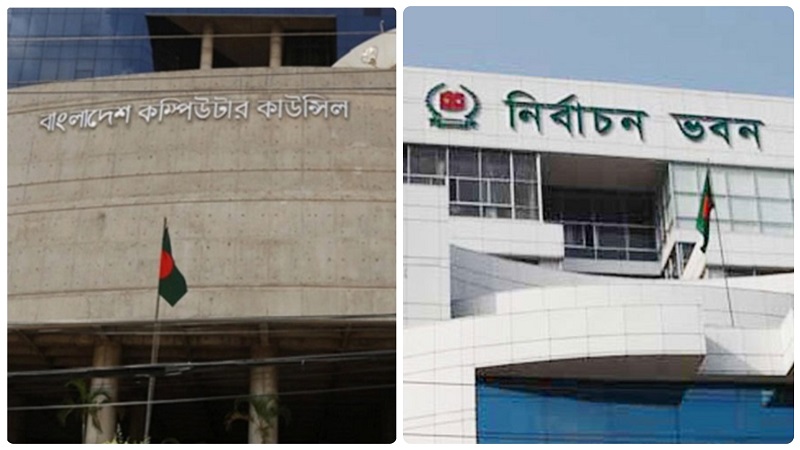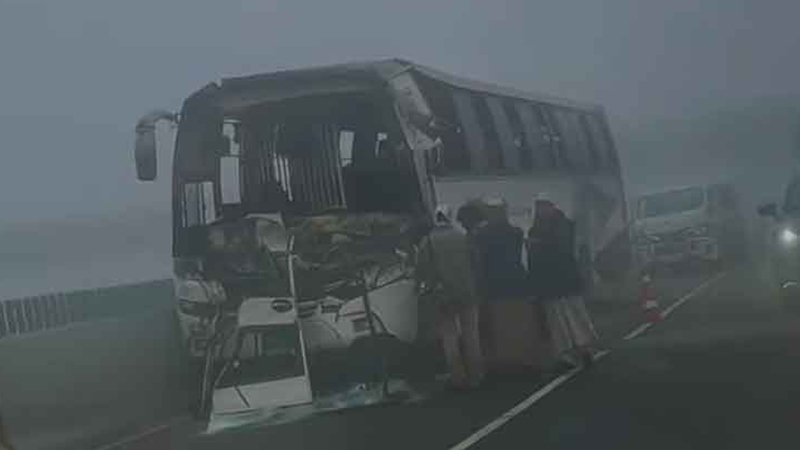The average monthly income of Fakhrul Islam, a Karwan Bazar-based electrician, from restoring severed illegal power connections is about Tk 20,000.
Roadside restaurants and shops are Fakhrul’s regular clients from whom he gets minimum 50 calls a month to reestablish illegal power lines snapped by Dhaka Power Distribution Company.
‘It’s risky business. I put my life on the line every day,’ said Fakhrul while using a bamboo to cling an aluminum hook to a 220 KV naked power line at an electricity pole near Karwan Bazar truck stand on September 13.
Wearing lungi, rubber sandals and T-shirt, Fakhrul worked from the rooftop of a one-story office building, wet from fresh showers. Electric sparks flew off in all directions as he was trying to place the hook with the bamboo.
A power transformer was very close to Fakhrul and right down the pole was the kitchen of a restaurant where dented LPG cylinders were handled without care.
‘This is the second time in three months authorities have cut the illegal power line,’ said the owner of the restaurant, requesting anonymity.
The power connection to his restaurant was removed three hours ago.
The restaurant owner pays a DPDC linesman Tk 500 every month to keep him from noticing the illegal power connection.
Seven other businessmen share the same cluster of illegal power connections to illuminate their shops after dark and it was just one of many such clusters of connections in Karwan Bazar and countless clusters elsewhere in the country.
Electrical accidents, many of them from such illegal power connections, are so common in Bangladesh that they have inspired numerous songs and documentaries on amputated electricians.
Lack of disaggregated data makes it impossible to put a number on the accidents linked to illegal power connections.
But almost 40 per cent of the 24,074 fires the fire service registered last year originated from electrical problems. The fires killed 184 people and injured 560.
Many of the fires broke out in areas such as slums where legal power lines do not exist.
Government probes linked the recent Narayanganj mosque explosion, too, which killed 32 worshippers, to illegal power connection.
The mosque authorities told investigators from the state utility Titas that the illegal power line was verbally approved by the DPDC.
DPDC managing director Bikash Dewan denied approving any illegal connection in areas under his authority and said that the number of illegal connections declined significantly over the last few years.
‘There are some people still stealing electricity but we are taking tough actions against them,’ said Bikash.
Power secretary Sultan Ahmed said that illegal power lines were unsafe for they were drawn by untrained electricians hardly aware of the safety measures required to be in place to prevent accidents.
‘We have to realise that by taking illegal power connections we don’t only steal electricity but create many accident risks too,’ said Sultan.
In July and August, six power distributors snapped 1,195 illegal power connections, mostly in cities.
A month ago the Energy and Mineral Resources Division found a Gazipur captive power plant illegally selling electricity to regular consumers.
‘They even illegally installed 41 electric meters to sell captive power,’ said energy and mineral resources secretary Anisur Rahman.
Industries often make national and international headlines for fire accidents caused by unsafe power connections.
While dodging the payment for power consumption might be the motivation for some people to avail illegal power connections, some people are forced to take such connections.
Power distributors still do not have a system to supply power to hundreds of thousands of floating people in the capital and elsewhere.
Thousands of them run makeshift shops by roads, powered by illegally obtained electricity.
They use metal hooks, cheap and substandard electrical gadgets to have illegal power connections.
For about four million people living in the slums or slum-like structures in the capital, the DPDC and DESCO have so far provided only about 6,000 power connections. Floating people do not get access to power because they frequently change addresses and live in houses built on khas land.
‘We are trying to bring floating people under electrification by installing pre-paid meters,’ said DESCO managing director Kausar Ameer Ali. Consumers Association of Bangladesh said that power theft played a significant role in increasing the deficit in the power sector, which crossed Tk 8,000 crore last year.
The power unaccounted for is considered lost while being transmitted and distributed and the loss is adjusted to power bills.
The power transmission and distribution system losses in Bangladesh are about 9 per cent, which are 5 per cent in the USA and can be significantly reduced through efficient power managemen













